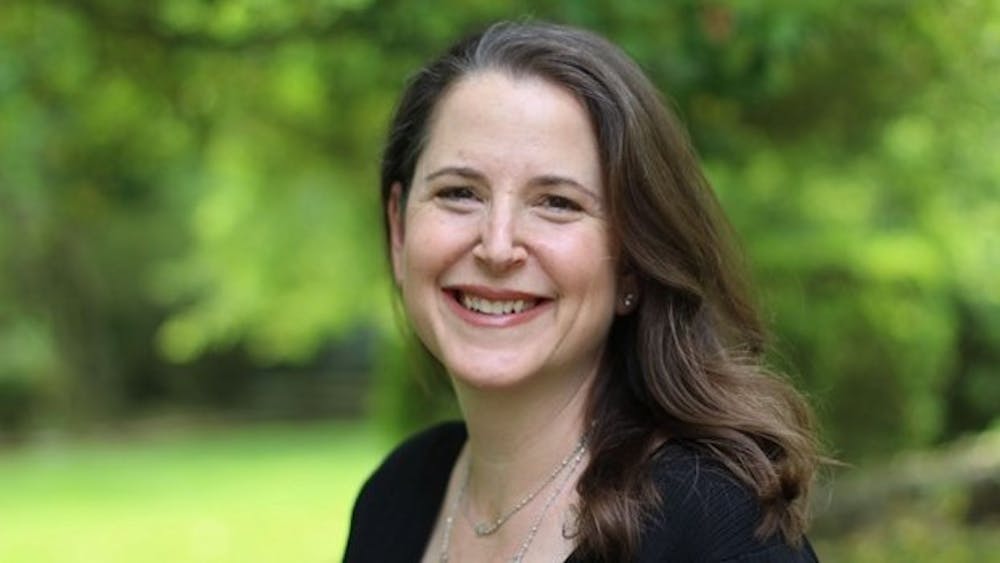Policy regarding disability inclusivity has long been a roaring debate in the United States. In the midst of polarized discourse, Amy Lutz has dedicated her academic and personal life to championing the implementation of support systems for the cognitively impaired. Through her literary journey as a current Penn faculty member and a medical historian, Lutz advocates for an approach to disability policy and practice that recognizes the intense and lifelong needs of profoundly autistic people.
Lutz’s path to autism espousal stems from the cognitive impairments of her eldest son. “My oldest son, Jonah, who is 24 now, is severely autistic. He has a very significant intellectual disability, a tested IQ of 40. He is minimally verbal and has a history of very aggressive and self–injurious behavior that necessitated an almost yearlong hospitalization when he was only nine years old. So it’s been a pretty tough journey,” she says.
As Jonah grew up, Lutz started to feel as though autism’s true reflection had been lost in the status quo. “It seemed like a crazy world where the autism that we were living with at home was really different from the autism that I was seeing in the media. Like in The Big Bang Theory, where autism was Sheldon’s kind of quirky genius,” she says. This public misunderstanding became the catalyst of Lutz’s work as she dedicated her life to writing and educating about the nuances of autism.
Throughout her career as an author, her first two books, titled Each Day I Like It Better and We Walk, were largely shaped around raising Jonah. The themes revolved around the struggle that many parents face when raising severely autistic children while examining prevalent social issues like inclusion and therapeutics.
After receiving her Ph.D. in History and Sociology of Science and joining the Penn faculty team, she has now released her third book, which is available via online retailers and at the Penn Bookstore. This book was written “to expose a false assumption that informs much disability policy today and explain where it comes from,” she says. Chasing the Intact Mind dissects this narrative and the permeating idea of what she calls the “intact mind.”
The idea of the intact mind is defined by the notion that even in profoundly autistic individuals, there exists “a typical, or even genius intellect, even if they present as severely cognitively impaired,” Lutz says.
Lutz’s ideology on the matter revolves around the idea that the intact mind does not exist in profoundly autistic individuals. Lutz argues that the intact mind does not reflect anything biologically true about autism and that profoundly autistic people typically have minds with great cognitive impairment. Still, despite differences, they are still valued members of our human community and deserve the intensive and disability–specific support systems they often need to thrive.
Besides tracing the intellectual history of the intact mind assumption, Lutz includes three case studies to illustrate how this idea is foundational to much contemporary disability policy and practice. For example, one chapter is dedicated to the ongoing fight to eliminate 14(c), otherwise known as the subminimum wage. While disability rights advocates argue that everyone is capable of a competitive minimum wage job, Lutz argues that 14(c) settings are very popular with a subset of significantly cognitively impaired individuals and their families for a range of reasons that are ignored by advocates who are intent on eliminating this model.
Lutz’s literary support for autism advocacy extends through more than just her book publications; her perspectives have been supported in an academic setting as well. “I love bioethics. It is the kind of literature to really address some of these issues. I published in The American Journal of Bioethics, and that article was about representation in the autism community,” she says.
Typically, Lutz’s work is more public facing and featured on media platforms such as The Atlantic or Slate. As a result, Lutz considers one of her most rewarding professional moments to be the publication of an article she co–wrote with colleagues from Penn’s Medical Ethics department in The American Journal of Bioethics. “I’m really proud of that piece, which focused on representation in the autism community,” she says. “We introduced a new framework of thinking about legitimacy in autism advocacy that we called ‘partial representation,’ that other scholars have picked up.”
In addition to being a voice through literature and gaining exposure to disability history through writing, Lutz believes it is important for individuals interested in neurodiversity advocacy to gain first–hand experiences as well. She holds that it is autistic individuals on the far side of the spectrum that have become underrepresented in today’s disability atmosphere. As a result, more strides must be taken by the public to speak on behalf of those who are severely cognitively impaired.
“If you're interested in getting into autism advocacy, spend some time with profoundly affected people and their families. Get to know those families and talk to them. Just make sure that your disability advocacy reflects the diversity of presentations in the autism community,” she says.
While Lutz is brainstorming for her next major writing project, her passion for supporting profoundly autistic individuals continues to burn. “There are a bunch of things I would love to work on. I think there's so much room in this space for historical work, and it's hard to find enough time in the day to do it all,” she says.
Lutz will continue her work in disability activism and hopes that her message continues to resonate into a lasting legacy for autism advocacy. “Shine a light on the profound end of the autism spectrum, and make sure that you know that this population is not ignored or forgotten in these ongoing policy debates,” she concludes.

